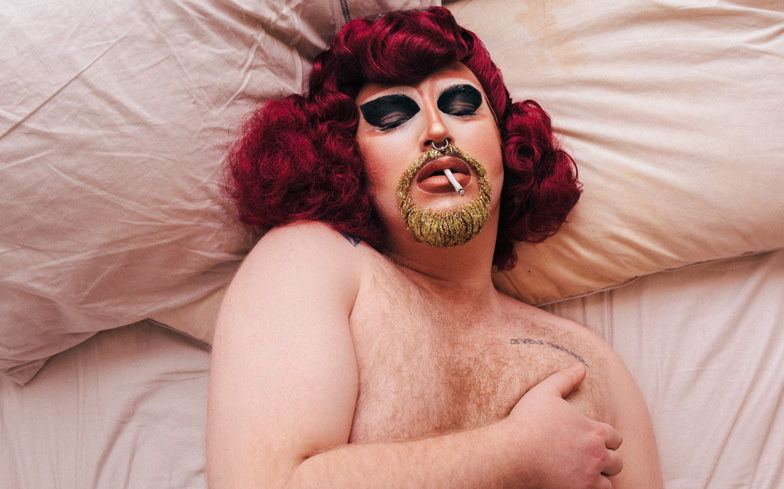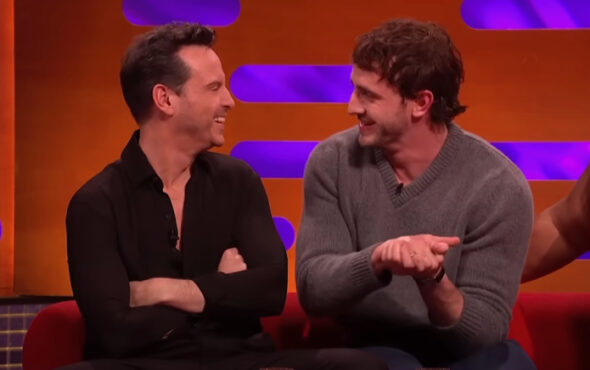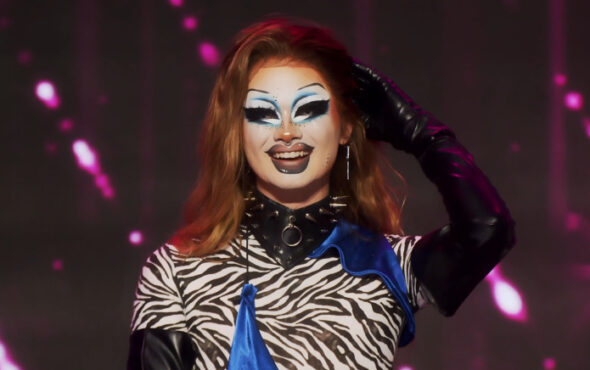
It takes but two seconds of being with Tom Rasmussen – or Crystal Rasmussen, if you’ve met them in drag – to fall in love.
Their vibrant personality, outrageous life stories and positive outlook on life have become their greatest assets. That is, after their skill with a makeup brush. Have you seen that drag contour?
But alongside the pleasing aesthetic is a tough, but justified, approach to the world they navigate. A proud voice for the non-binary community, Tom’s taking a first step into the world of publishing by snatching that byline and releasing their own memoir, Diary of a Drag Queen. Following a year in the life of Crystal, it covers everything from the hilarity of being a PA – which involved being a ‘personal sexter’ to their boss’ boyfriend – to the bleak reality of being queer in London in 2019. There’s even a rather direct peek into his sexual encounters both in and out of drag.
Here, they speak to friend, journalist and fellow drag superstar Amrou Al-Kadhi about discovering their true gender identity, how their mother influenced their drag, and why they’re ready to serve serious Carrie Bradshaw vibes with the release of their book – or queer bible, as it should now be known.
Amrou Al-Kadhi: Hi baby.
Tom Rasmussen: Hi mumma. How are you?
AA: I’m good, thanks. Just returned from the most wonderful Christmas with you in Lancaster. It was amazing going to see where you grew up and how far you’ve come, and it was amazing how, I thought, all the women were where you lived and how expressive, kind and generous they were, and how it really reminded me of you in drag.
TR: It’s funny because Crystal is so about wealth that when I birthed that character, it was about escaping where I came from and my fantasy was about being rich and wearing couture. Now, the more time and thought and examination I give to my own class and where I’m from, the more I see how many cues I took from those amazing women who take up space in radical ways – being incredibly caring and generous and really fucking funny. They are in charge and in control.
AA: In your book – which I loved and can’t wait for the world to read – there’s a lot of everyday violence which is really heartbreaking, yet it doesn’t change how much you loved your upbringing.
TR: I actually wrote the book up there. I went away and wrote the book in my teenage bedroom at home in Lancaster. One of the key relationships is me and my mother, as it often is for a lot of queer people. Writing about my mum is an exact mirror of how I feel about home. Me and my mum hit many breaking points and then worked through it – and that’s testament to her. Until I came out she’d never met a queer person or a gay person before, and neither had I. I’m sure you had a similar experience to that, where you’re the first person to do this and you don’t fucking know what you’re doing. I needed guidance, she failed on that, and then after seven or eight years of fights, arguments, breaking points, things took a turn… How did you find Lancaster?
AA: I loved it!
TR: What were your preconceptions and what did you feel when you got there?
AA: Talking to you and the book had already undone a lot of my preconceptions. I found it really warm. I found the level of community and the amount of people who were in my ear… a lot. It was weird because we were forgiving behaviours like complete misgendering on both of us, but weirdly I forgave because everyone was so kind.
TR: I’ve been thinking loads about, how, if someone got my pronoun wrong in London who should know how to use a they pronoun, I would be very much like…
AA: ‘What are you doing?’
TR: I would feel much happier coming for them which is such a horrible thing to do to anyone as it might be their first time using a they pronoun, but if you’re in these circles then you should know.
Related: Ezra Miller would love to see a non-binary magical human in Fantastic Beasts
AA: You should know.
TR: You should know, and once I tell you, you should try. We were there for five days and by the end, both you and I were not really correcting anyone which is problematic and I felt weird about doing it. They’re trying. My mum tries and she says things like, ‘He’s using a they pronoun.’ So outrageous.
AA: In the Arab language, it’s so gendered. Every noun in gendered. It’s not in a transphobic way, and my mum doesn’t know how to use a they pronoun, not that I’ve asked her.
TR: Are there any gender neutral nouns?
AA: No, it’s so gendered.
TR: It’s not a possibility?
AA: No, even Allah who is genderqueer in the Quran as they’ve got a womb, we use the male pronoun even though technically we know they’re not.
TR: Does anyone use a female pronoun for Allah?
AA: Not without a fatwa I don’t think.
TR: Ah, okay!
AA: Let’s talk about the book, because what I find so amazing is how frank you are about all your sexual experiences. You really ‘normalise’ radical sex. How do you feel about the world having intimate knowledge of your sex life?
TR: When I talked about writing the book, one of the key aims was that it was accessible for a wider audience. For my girlfriends in Lancaster, my primary school teacher… I wanted it to be frank and accessible. I didn’t want my sex life to my mythologised or, because it is queer sex, totally misunderstood, shrouded in so much seediness and shame. For me, the political decision was that I’m always honest, but if you talk about being made to drink from a toilet during sex as you talk about going to the shops, it takes the wind out of it in a way and so a lot of the homophobic experiences I have comes back to the way I have sex. I’ve had really great sex and I really wanted to write about that!
AA: Power to you!
TR: It’s great and fucking funny!
AA: I thought it was Disney in a way, the tone as if you were just getting a manicure. You were making what others perceive to be as such transgressive acts like something in a rom com.
TR: When it was down to editing, there were a lot of parts that my editors weren’t sure about. I really take pleasure in it because telling quite frank sex stories has, personally, been a test for if people deserve my time, or don’t. That sounds really savage, but if they’re going to freak out about me then they’re not really necessary.
AA: We do have a big sexual taboo in this country. It’s so weird and why this book I think will be loved by a lot of people. It’s nice to be met with the baseness of what we’re all like. Nobody is not sweating when we’re having sex. It’s going to be joy for a lot of people to have you being so frank and get rid of their own shame.
TR: Yeah.
AA: Myself, I’m nervous talking about poo sometimes. It’s nice because you just bring it up.
TR: The truth is that it’s scary talking about poo or seeing it, but actually it’s to take the wind out of things. I know the secret conversations I’ve had with friends or sexual partners is that everyone has had a bit of poo in their sex. We’re all having it so why aren’t we talking about it? It’s upending a lot of shame in my life.
AA: Yeah!
Related: The transgender military ban: How minorities can boost mission success
TR: One question that I wanted to put to you was: With RuPaul coming to the UK and with the slight ‘normalisation’ of drag – which is tricky territory for me as we still all get harassed on the street everywhere we go, so it might be normalised in culture but in the real world when you’re stepping down the street in East London, it’s not socialised – someone asked me if drag has lost all its potential?
AA: I think drag has, at points, lost its politics mass-culturally. I think it’s very easy for people to have a regularly accessible transgressive image. An event goes, ‘Let’s spice things up and get a man in a dress to stand somewhere’. There’s something always political of someone renouncing their gender. Drag has been reduced to this quick cherry on top, and it’s interesting the backlash to the RuPaul’s Drag Race thing. There’s many performers on the ground who would not go on the show – non-binary queens, trans performers, drag princes, drag kings, and their work is political and just doesn’t work mass-culturally. We’re not seeing that so maybe a specific type of drag has lost its bite.
TR: The book is technically a memoir and listed under memoir, which I find very glamorous, but really it was about the fact we’re not just an image or a fabulous accessory. It’s so tacky to say but we’re actually people with day-to-day lives.
AA: And the sacrifices you made to be a drag queen as well.
TR: Oh shit, yeah.
AA: One of the most moving parts of the book is –and I don’t want to spoil it – is when you help a cis man not get run over before he attacked you for being in drag.
TR: The invention of this book was that I was obsessed with the mundanity of life. Again, if you look at media now and the portrayal of queer people, it’s so often totally hyped and not really how it is. It’s totally misplaced. You’re a drag queen, I’m a drag queen. We could both write books about ‘the fabulous guide to life’ but every fucker knows that. I had a lot of editorial push back on the real dull shit.
AA: It’s messy, which I like. We both decided to embark on coming out as being non-binary and using the they pronoun. I know that I felt dysphoric about the gay community. I went to a gay club the other day, and it was so cis and male. How has your non-binary identity changed how you see yourself within the LGBTQ landscape?
TR: It’s a good question… I always was aware that I was gender non-conforming. I had a time when I came out where I was telling my close friends that I was trans. It was before a development language, community and presence for non-binary and trans people and I was misunderstanding myself so I went back into being gay male. I always felt discomfort in those spaces. In the book I have a lot of disdain for gay men – but I also love the gays. I’m very culturally gay. My sexuality has changed a little in that it’s opened me up to more queer forms of sex.
AA: Ditto.
TR: Queer forms of attraction.
Related: “There’s no place like home”: Thinking about Belonging this LGBT History Month
AA: I’m way more open to the people I’m having sex with now. I really want to explore different types of bodies.
TR: I feel that the thing that used to cause me a lot of pain is the thing that gives me the most pleasure now. That’s amazing and I still believe that while I joke and criticise gays in the book because we all do a lot wrong and a lot of gay men can be kind of shitty, it’s still hard to be LGBTQ and it’s harder for different people within those categories. Even to be gay, and I know I talk about how stupid things like National Coming Out Day are, it’s still hard for people. If I look back at myself when I came out 14 years ago, it was really hard and I wouldn’t want anyone to have the experience I had. I still have sympathy… but I’m also ready to read these people.
AA: This book is coming out soon. I hope you still remember me honey when you’re in those dizzying heights. Everyone is going to die, it’s so funny, warm, loving, beautifully written. A complete page-turner.
TR: Also can we get our life for how diva and Hollywood enquirer this is. Sat around a table saying, ‘Tell me about the book…’
AA: Love you.
TR: Thanks, love you.
More information on Diary of A Drag Queen can be found here.






